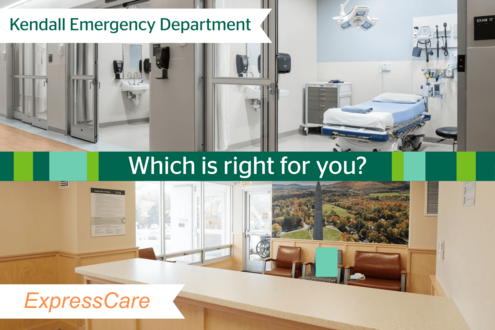
Summers are made for adventure. From hiking, biking, and camping to long days on the water, BBQs, and catching fireflies, there’s plenty of opportunity for fun. Unfortunately, those opportunities are also ripe for common summer discomforts (think bug bites and sunburn) and injuries.
To ensure you get the care you need, it pays to know where to turn for help when your doctor is not available or the issue needs prompt attention.
For readers of this newsletter, there are two solid options: SVMC’s ExpressCare and the Kendall Emergency Department.
While both offer no-appointment-necessary care, there are significant differences you should consider before deciding where to go.
The biggest differences between ExpressCare and the Kendall Emergency Department is the severity of the health issues they treat and the hours they’re open.
Here’s a quick look at each option:
ExpressCare
Open daily 8 a.m. to 6 p.m.
Staffed with physician assistants, nurse practitioners, and nurses who can order basic labs and imaging to help formulate diagnoses and treatment plans, ExpressCare often offers shorter wait times than the Emergency Department.
Ideal for issues you would normally address with your primary care doctor, including:
- Rash or skin infection
- Earache
- Cold and flu-like symptoms
- Minor injury (broken bones, strains and sprains)
- Low-grade fever (fever without confusion or seizures)
- Back pain
- Urinary Tract Infection (UTI)
- Insect bites
- Eye irritation
- Sexually transmitted infection (STI)
- Minor cuts requiring stitches
- Diarrhea
- Mild asthma attacks
Hours of operation: Open daily 8 a.m. to 6 p.m., no appointment needed
Closed Thanksgiving and Christmas Day
The Kendall Emergency Department
Open 24/7
Staffed and equipped to treat life- or limb-threatening health conditions, including:
- Heart conditions or heart attack symptoms (chest pain or pressure)
- Stroke symptoms (sudden change in vision, strength, speech, or difficulty walking)
- Confusion
- Stomach pain/vomiting
- Internal bleeding
- Difficulty breathing
- Dehydration
- Dizziness/passing out
- Serious injuries/trauma
- Mental health crisis
- Seizures
- Severe allergic reaction (swelling of the lips, difficulty breathing or swallowing)
- Pregnant with vaginal bleeding and/or abdominal pain.
- Suspected overdose/poisoning
Hours of operation: 24 hours/7 days a week
When to call 9-1-1
Even though it’s often clear that someone needs urgent medical care, you may not be sure if you should call 9-1-1. SVMC health professionals will always caution ‘when in doubt, call 9-1-1.’
The advantage of calling 9-1-1 is that the emergency services team can assess patients immediately, begin life-saving treatment for severe conditions, and determine what facility the patient should be transported to for the most appropriate care.
When medical emergencies happen, minutes can have a huge impact on an individual’s outcome and recovery. Calling 9-1-1 is the best option for getting them quickly and safely to the right facility.
Dr. Adam Cohen, Medical Director of the Kendall Emergency Department at Southwestern Vermont Medical Center.